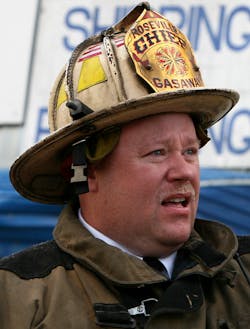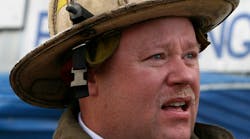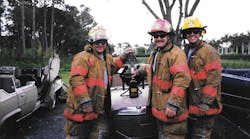In 2009, I hung up my turnout gear and left my position as a fire chief after serving 30-plus years. Shortly thereafter I wrote an article for Firehouse.com about the challenges first responders can face as we transition from being a public safety provider to civilian life.
The feedback to that article was so overwhelmingly positive that I developed a program that I presented at a national conference bearing the same title as the article. To my surprise, many of the session attendees brought their spouses along with them. During the session we laughed, we cried and we connected in very meaningful and personal ways. I realized there are many, many responders both afraid and unprepared for what to expect when they climb down the ladder.
Over the past year, this issue has resurfaced in a significant way. During my programs on situational awareness, I often ask those in attendance with more than 30 years of service to raise their hands and then I ask them some questions related to the class topic. I take note of who these people are and then when we are on break or at lunch I asked them some different questions—questions about their planning and preparation for their climb down the ladder.
What I am finding is many of them are scared and under-prepared for what the “afterlife” will mean for them. Some say they love golfing and plan to play more. Others will mention their grandkids and say they plan to spend more time with them. Some have gardens. Some have hobbies. But very few ever offer anything close to a plan that includes doing meaningful work for the benefit of others.
Find a purpose
Responders are first and foremost servants of humankind. I cannot explain how or why it happens but for most of us–myself included–it burns in our souls. We yearn to give. We have a passion to make a difference. We thrive on living purpose-driven lives.
Throughout my career, this mindset (and heartset) made me pop out of bed each morning like a piece of bread from the toaster, clap my hands together and rejoice that I got to go do something I love so much. Granted, not every day was joyous and once you become a chief the politics and personnel issues can wear you down. But in the end, we know that our efforts make a difference in our communities and for our members and that gives us purpose.
Status in the community
The position of firefighter is one of status and respect in the community. And every rank advancement thereafter adds to the status and respect. Not everyone will advance through the ranks throughout their careers and that’s perfectly fine. Regardless of formal rank advancements, tenure builds status. Even the senior non-officer in a department holds a level of status and reverence for their knowledge and longevity.
As time goes by, the knowledge we acquire increases our value to the organization and the members who look up to us for guidance and wisdom. Passionate, tenured, servant-minded members are quick to share their knowledge and to help others be their best. They share their successes and failures in hopes that others will avoid making the same mistakes. This contributes to their status in the organization.
All good things must come to an end
For me, the end of my active duty career was a (mostly) planned departure. At roughly the start of my 25th year in the fire service, I decided that I was ready to move on to new challenges and for me that meant pursuing a position as a college professor so that I could share my life’s experiences in a meaningful way. To help prepare me for this journey, I enrolled in a PhD program that I estimated would take roughly five years to complete. The motivation for this educational endeavor was the degree would open up doors of opportunity at universities and help me secure a position for my afterlife.
One would think (as I did) that with all the thought I put into planning and scripting my exit, and having a stable plan for the next chapter of my life, that my climb down the ladder would be easy and the transition would be smooth. However, there were some very significant holes in my plan. Things happened that I did not anticipate.
For a guy who travels the world teaching responders about situational awareness this might seem odd. Looking back now–seven years later–my understanding of what happened is much clearer. What I would like to do is share with you my experience and those of many I have talked to as all the good things came to an end.
The routine
The first thing I had to come to grips with is I would wake up in the morning, pop out of bed like a piece of bread from the toaster, clap my hands together, and hang my head in sorrow that I did not get to go do that something that I loved doing for 30 years. Even though I had taken five years to prepare for my afterlife, there was now a great void in my routine.
There was no uniform to don. There was nowhere I was supposed to be. There was no one for me to serve. There were no organizational crises for me to solve. There were no emergency responses that needed my lifetime of acquired knowledge. There were no firefighters for me to develop or help ensure their safety. It was the saddest and loneliest I’d felt in my entire life. I was a nobody.
From hero to zero
The climb up the ladder of success for most is slow and difficult. But once we get to the top rung, the view is great. You get to influence policy creation, develop next-generation leaders and make a meaningful difference in the community—even beyond that of emergency services.
Chances are if you’ve worked in the same community for a while people not only know you, personally, but they know who you are. You’re a firefighter, or you're a fire captain, or you're the fire chief. That label becomes part of your identity. Yes, I am aware that all the leadership and self-help gurus say that your work should not define who you are but rather it should only be viewed as what you do.
I guarantee you not one of those leadership or self-help gurus ever served as a firefighter. Not only does being a firefighter define who we are, it tends to drive most, if not all, aspects of our lives—from the décor in our homes, to what we wear, to what we drive, to what we read, to who we hang out with.
Fire department family
We spend a lot of time in the firehouse and we spend a lot of time with other firefighters. For us there is a certain comfort that comes from being part of this tribe. We don’t talk about it much, but we know the next call could be our last and that we might have to depend on those we are sitting around the kitchen table with to save our lives.
It matters not that there are some in the firehouse who, for various reasons, we don’t care for much. We know that when the bells go off, all of that gets set aside and we are bonded together in brother- and sisterhood. There is something special about being among people you know will die for you.
But when you climb down the ladder, that bond is broken. I don’t care what they say. They may encourage you to come around and have a cup of coffee or stop down on drill night or come and be part of a community event. But you’re not one of them anymore. You’re not connected through that unspoken life and death trust bond.
You’re now a civilian visitor in the very environment where you once had status—where your presence and contribution were meaningful. The environment feels different because it is different. You’re now a guest instead of family.
Some in the family are going to treat you like you just divorced their favorite relative. They never liked you from the start. They just tolerated you and maybe even sucked up to you because you had formal authority. With the delivery of the final divorce decree, they no longer even acknowledge your existence.
Those you talked to, texted and emailed daily and sometimes many times daily, evaporate from your life as fast as a magician can make a rabbit disappear. You no longer have relevance to them. They no longer need you to get what they want. You have been voted off the proverbial island. It’s clear that even for those who are courteous to you, something is different. You’re no longer on the inside.
Some who climb down the ladder may adapt to this well. I did not. I didn’t expect that so many people were going to be permanently out of my life and in such an abrupt way. Even when I did reach out to a few of them it seemed like they weren’t too interested in anything I had to say. It didn’t take long for me to feel completely divorced from my fire department family.
Identity crisis
There is an identity crisis of sorts that befalls us once we are no longer doing what we’ve done for so long. I had been a fire chief for 19 years (on two different departments). I had been the fire chief for so long that it had become my identity.
Worse, and even unexpectedly, it had also become the identity of my family. Many of my wife’s friends were spouses of other firefighters. When I was no longer the fire chief, she was no longer the fire chief’s wife and much like my ties to the fire department family severed, so did hers.
It became evident that she was only a friend by mutual association. The wives of firefighters have a bond. They do things together. They talk and console each other. The wife of the fire chief now turned civilian, no longer has that bond and the insider’s club was quick to vote her off their island too. Sad as it may be, part of my wife’s identity was that as “Mrs. Chief” until that day came I was no longer chief and she became “Mrs. Nobody.”
Then there are my kids. When I left the fire department I had four kids (ranging in ages from 9 to 17). I had not given much thought to how my departure was going to impact them. For all their lives I had been the fire chief. They’d never known dad to be anything else. They had free access to the fire station, my office and regularly climbed into the fire trucks to live out their “I’m a firefighter just like my dad” fantasies.
Suddenly, all that was gone. They had no fire chief dad to visit. They had no fire station to take refuge in. They had no gear that needed donning. They had no fire engines to climb on.
The reality gut-punch came when I told my 9-year-old that daddy was leaving his job as the fire chief. I can remember his look of confusion and bewilderment. I told him I was going to become a teacher and help firefighters be safer. To me, that was a noble calling, right? To him, it meant nothing. “What will I tell all my friends at school that my dad does now?”
Not only was my identity deeply connected to my position as the fire chief, but so was my wife’s and now I realized so were my kids. I didn’t see this coming. If I did, I would have done something to better prepare my family and myself for this. It was one thing for me to be lost and hurting. But it was another thing altogether for them to be lost and hurting because my career was coming to an end.
When the climb down becomes a fall
Not everyone climbs down the ladder of success with a plan and with grace. At least I had a plan for my afterlife employment. But my plan was far from complete and I certainly was lacking in the grace category. Even with the plan I had developed some five years earlier, it felt like I had fallen from the ladder versus climbing down.
While it was incomplete, I felt fortunate that I had something that resembled a plan. Some do not have a plan and a sudden loss of their job (e.g., illness, injury, layoff or termination) and that subsequently results in a rapid fall from the ladder and a very painful landing—all of which are usually in very public view. When this happens the loss identity and purpose is compounded by fear, embarrassment and very deep sense of loss and betrayal.
Bringing it full circle
So how did I fare and what did I learn? First, I fared quite well. Even though I went through a tremendous emotional roller coaster, loss of my identity, stripped of my uniform and comfortable routine, it all worked out for me. Why? Because I had been purposeful about my climb down? No. I wish I could tell you that was the reason. I would look so much smarter if that were the reason.
You see, my plan didn't work out. As Helmuth von Moltke, chief of staff for the Prussian army stated: “No plan survives an encounter with the enemy” and neither did my plan. But Dwight D. Eisenhower, Supreme Commander of the Allied Forces during WWII and the 34th President of the United States noted: “Plans are worthless, but planning is everything.” Amen to that. The process of planning for me was indeed priceless. At least I wasn’t caught totally off-guard. I had given some thought—a lot of thought actually—to what my afterlife would look like and the things I could do to sustain my passion for helping others. And then, in a rather unexpected turn of events, I found my new identity.
The rebirth of a career
Recall that the motivation for enrolling in a PhD program was to prepare me to teach at a university and that would be my new post-fire service career. Well, that never happened. Little did I know at the time that my doctoral research would yield findings on situational awareness and high-risk decision-making processes that the fire service would find valuable.
And little did I know that I would derive so much satisfaction out of sharing these finding and teaching first responders about situational awareness and high-risk decision making. I had found my new passion. I was popping out of bed again, clapping my hands together, throwing in a fist-pump or two and doing my happy dance because I was getting to make a difference again. I was serving others. I once again had passion and purpose.
The situational awareness lesson
A lot of water has gone over my proverbial damn since I climbed down the ladder. I’ve learned a lot about situational awareness and I would like to, with your indulgence, make the connection between my climb down the ladder to my present passion for situational awareness.
First responders define situational awareness as: Having the ability to perceive and understand what is happening in your current environment—in the context of how time is passing—and then being able to make accurate predictions of future events, hopefully in time to avoid bad outcomes. Of course, I am teaching this in the frame of first responder emergency scene decision making.
In my programs, after sharing the definition, we spend a lot of time breaking down the processes of perception, understanding and prediction as the three main components of situational awareness development and follow that with explaining how situational awareness becomes the foundation for good decision making.
However, here I am applying this definition to my climb down the ladder. As I look back, it is easy for me to see that I had flawed situational awareness on all three levels: Perception, understanding and prediction. Next time, we’ll explore how that happened.
RICHARD B. GASAWAY, Ph.D., served 30 years in public safety, including 22 years as a chief fire officer, before retiring in 2009. He holds bachelor’s, master’s and a doctor of philosophy degrees in finance, economics, business administration and leadership and is the principal consultant at the Gasaway Consulting Group. He runs the Situational Awareness Matters! website www.SAMatters.com.








